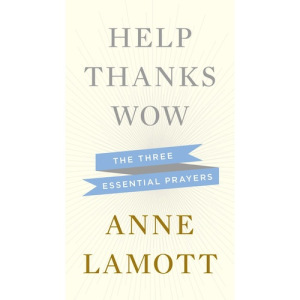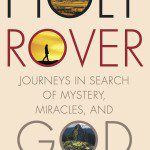
I love Anne Lamott for many reasons, including the fact that she wrote one of my all-time favorite religious comments (“I thought such awful thoughts that I cannot even say them out loud because they would make Jesus want to drink gin straight out of the cat dish.”) So it’s not surprising that I’m recommending her newest book, Help, Thanks, Wow: The Three Essential Prayers. While slim in length, it packs a lot of wisdom into its pages.
The book is Lamott’s summation of everything she’s learned about prayer. A devout–though unconventional–Christian, she writes that the three prayers we all need the most are those that ask for assistance, those that give thanks for the good things we experience, and those that express our awe at the world. Help. Thanks. Wow!
 “Prayer can be motion and stillness and energy–all at the same time,” she writes. “It begins with stopping in our tracks, or with our backs against the wall, or when we are going under the waves, or when we are just so sick and tired of being psychically sick and tired that we surrender, or at least we finally stop running away and at long last walk or lurch or crawl toward something. Or maybe, miraculously, we just release our grip slightly.”
“Prayer can be motion and stillness and energy–all at the same time,” she writes. “It begins with stopping in our tracks, or with our backs against the wall, or when we are going under the waves, or when we are just so sick and tired of being psychically sick and tired that we surrender, or at least we finally stop running away and at long last walk or lurch or crawl toward something. Or maybe, miraculously, we just release our grip slightly.”
Raised in a household where her parents worshiped in the Church of the New York Times, Lamott absorbed early the message that prayer was for the ignorant and misguided. But somewhere along the line, in between hard knocks and failed relationships and battles with addictions, she started praying and hasn’t stopped since.
She writes, “My personal belief is that God looks through Her Rolodex when She has a certain kind of desperate person in Her care, and assigns that person to some screwed-up soul like you or me, and makes it hard for us to ignore that person’s suffering, so we show up even when it is extremely inconvenient or just awful to be there.”
There are many wonderful gems and insights in this book. It’s a book to dip into when you’re not sure what to pray, or when you wonder whether prayer is worth doing at all. Lamott is brutally honest about her shortcomings and doesn’t claim to be wise (though I think often she is). One of her suggestions, for example, is a God Box. For 25 years she’s had a series of containers designated as a sort of divine mailbox. On a piece of paper, she’ll write what’s she’s obsessing about, what pains her, or what makes her angry. She scribbles a note, folds it up, sticks it in the box and closes it, telling God, “Here. You think you’re so big? Fine. You deal with it. Although I have a few excellent ideas on how best to proceed.” Then she makes a vow not to fuss about it. The willingness to do such a childish thing, she writes, comes from the pain of not being able to let go of something. The trick helps get our tentacles off the thing we most desire. Now that’s a piece of advice worthy of Solomon, in my opinion.
Here’s one last quote:
“Most good, honest prayers remind me that I am not in charge, that I cannot fix anything, and that I open myself to being helped by something, some force, some friends, some something. These prayers say, “Dear Some Something, I don’t know what I’m doing, I can’t see where I’m going. I’m getting more lost, more afraid, more clenched. Help.” These prayers acknowledge that I am clueless; but something else isn’t. While I am not going to go limp, I am asking for the willingness to step into truth. It’s like the old riddle: What’s the difference between you and God? God never thinks he’s you.”














